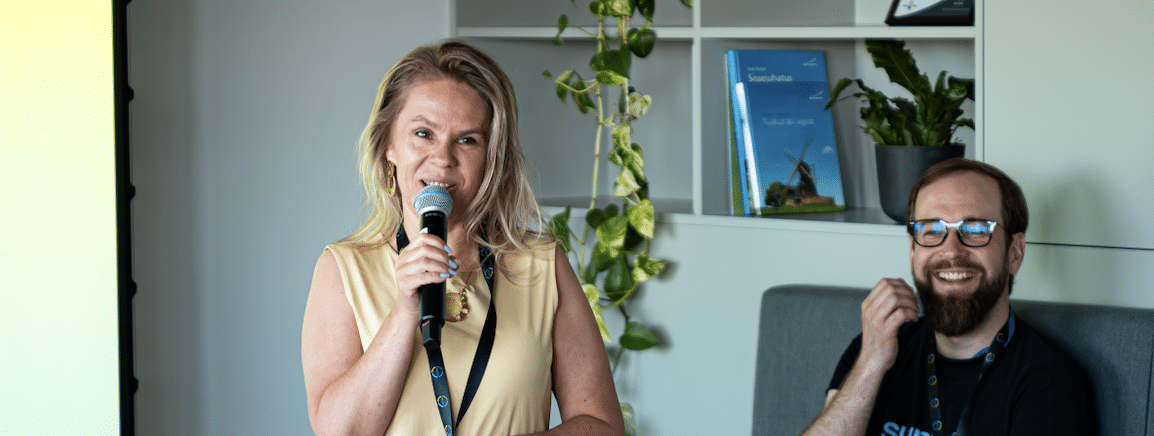Sunly hosted a community day at its new office in Tallinn’s Telliskivi district where a number of industry experts and community members emphasized that engaging local residents and addressing their concerns is the cornerstone of a successful energy policy.

The event was headed by Sunly’s Stakeholder Lead Tuuliki Kasonen, who launched the day by saying that the power of community and openness to new things can lead to great experiences and projects.

The keynote speaker was Priit Lepasepp, Sunly’s co-founder and CEO, who gave a comprehensive overview of the company’s plans and ambitions for shaping Estonia’s energy future. Lepasepp highlighted several important aspects concerning not only Sunly’s activities and the importance of community engagement, but broader energy policy and the future of Estonia as well.
Optimal use of the electricity grid
Lepasepp stressed that the future will be won by technologies with low running costs. He also talked about Sunly’s plans to make solar and wind work in a way that ensures economic benefits and environmental friendliness while making the most efficient use of the electricity grid which is a public resource. Hybrid farms, where a solar and a wind farm share a single connection point, combined with batteries and direct line consumers, are the next big trend in energy. Using the Risti energy farm as an example, Lepasepp explained how Sunly addresses the issue of minimising visual and environmental impacts. This is particularly important given society’s growing awareness and demand for green solutions, while also accounting for the needs of the local community in their home area.
Sunly co-founder and CEO stressed that realising the future vision for energy will require everyone’s input and cooperation – both public support and the active involvement of communities. This will enable the company to give back to communities in ways that suit them best, be it through virtual shares, cheaper electricity or, for example, the creation of charging facilities for electric buses.
A diversity of speakers at the Sunly community day

Jüri Mõis, one of Sunly’s investors said that the success of a renewable energy project depends on the satisfaction of all parties – customers, employees and owners. According to Mõis, it is vital to pay attention to local communities as well as the global economic environment to achieve sustainable development.

Olav Rommetveit, CEO of the Norwegian renewable energy company Zephyr, took the floor to present the Guleslettene wind farm project, a shared effort of 45 landowners and two municipalities. Local residents were provided with parking facilities, fishing spots and EV charging points, boosting tourism and attracting thousands of visitors to the area.

Community expert Peeter Vihma led a discussion on how to create a sense of ownership in today’s business world. According to Vihma, it is important to find ways to make local people feel as part of the project. Taavi Kotka, founder of the KOOS.io platform, stressed that virtual shares can foster a sense of community and participation in a way that benefits all parties.
Panel of mayors topped off the community day

Marko Pomerants moderated a panel of municipality mayors, focusing on the development potential of regions and the hypothesis that the advent of renewable energy could turn peripheral areas into winners. “We always hear that climate neutrality comes at a big cost, but if a responsible renewable energy developer gets close to a community, all it takes is a visit to an engagement meeting and the benefits will start to show,” Pomerants said, referring to Sunly’s virtual shares programme, which puts value on local people’s participation.

Tauno Võhmar, the Mayor of Alutaguse municipality, said each project will always be opposed by someone, but the focus should be on solutions and not excuses for why something cannot be done.
Madis Koit, the Mayor of Põhja-Pärnumaa municipality, noted that engaging communities and having an open dialogue is the only way to overcome problems and make projects successful. “Communities have to be the winners and they need to feel that they are,” Koit stressed.
It was noted that communication is a key element in the development of renewable energy projects. “Communication mistakes in the early phase of public engagement cannot not be corrected later,” said Rein Kruusmaa, Deputy Mayor of the Risti district of Lääne-Nigula municipality. “The backyard is always smaller than the number of potential intruders,” added Kruusmaa, referring to the need to find measures that would motivate the local community to believe in and benefit from the project.
Indrek Keskküla, the Mayor of Väike-Maarja municipality, also agreed that respectful and open dialogue with the community is critical for success. “An effective green tomorrow does not happen spontaneously,” he said.



See a photo gallery of the event on the Sunly and Communities Facebook page.
